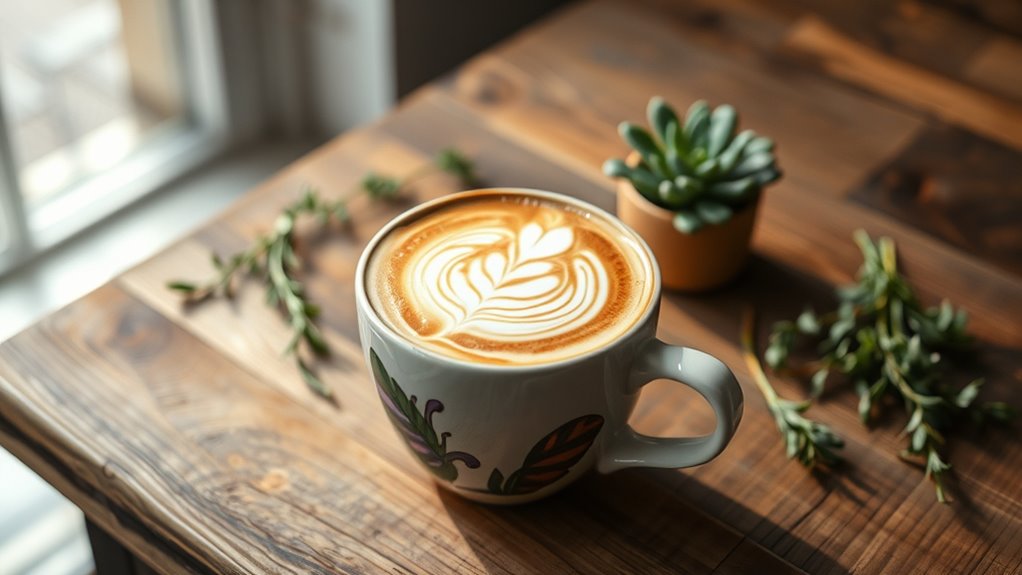Coffee trends reflect your values by emphasizing sustainability and ethical sourcing. You prioritize brands that practice transparency and support community impact. Specialty coffee’s rise shows your quest for quality and unique experiences, as you’re willing to pay more for traceable beans. Health consciousness is also reshaping your preferences, with a growing interest in low-caffeine options. The way you enjoy coffee continues to evolve, offering a glimpse into what drives your choices. Discover what else shapes these trends.
Key Takeaways
- Sustainability and ethical sourcing are crucial for younger consumers, who prioritize transparency and are willing to pay more for responsible brands.
- The rise of specialty coffee highlights a demand for quality, authenticity, and unique taste experiences among Millennials and Gen Z.
- Health-conscious choices, including low- and no-caffeine options, reflect growing consumer awareness of wellness in coffee consumption.
- Aesthetic presentations and customization in coffee drinks significantly influence younger consumers, tying visual appeal to brand loyalty.
- The shift towards convenience, like instant coffee and smart appliances, underscores the need for quality coffee experiences at home.
The Growing Importance of Sustainability in Coffee Choices
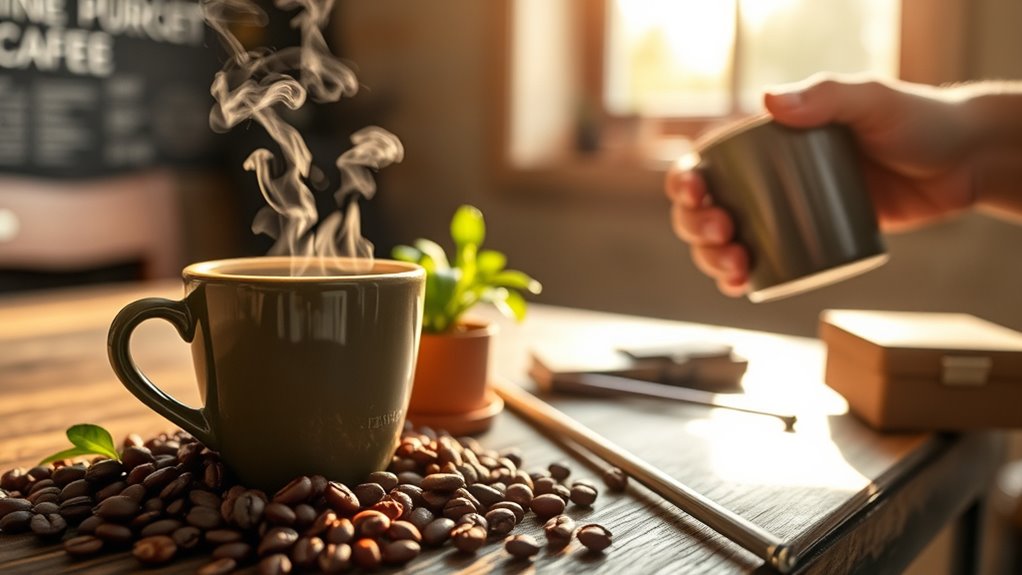
As consumers increasingly recognize the impact of their choices, sustainability has become an essential factor in coffee selection.
Millennials and Gen Z, who make up about 52% of the global population, prioritize sustainable sourcing and ethical sourcing when deciding which coffee brands to support. This generation demands transparency from companies, expecting them to share their sustainability practices and the origins of their beans.
Millennials and Gen Z value transparency and ethical sourcing in their coffee choices, shaping brand loyalty in the industry.
As the coffee industry faces scrutiny over its environmental impact, brands that embrace sustainable practices can build loyalty among conscious consumers.
However, economic pressures sometimes push consumers to prioritize taste over ethics, revealing a complex relationship between values and purchasing behavior.
Ultimately, brands that balance quality with sustainability will thrive in this evolving market.
The Rise of Specialty Coffee: A Quest for Quality
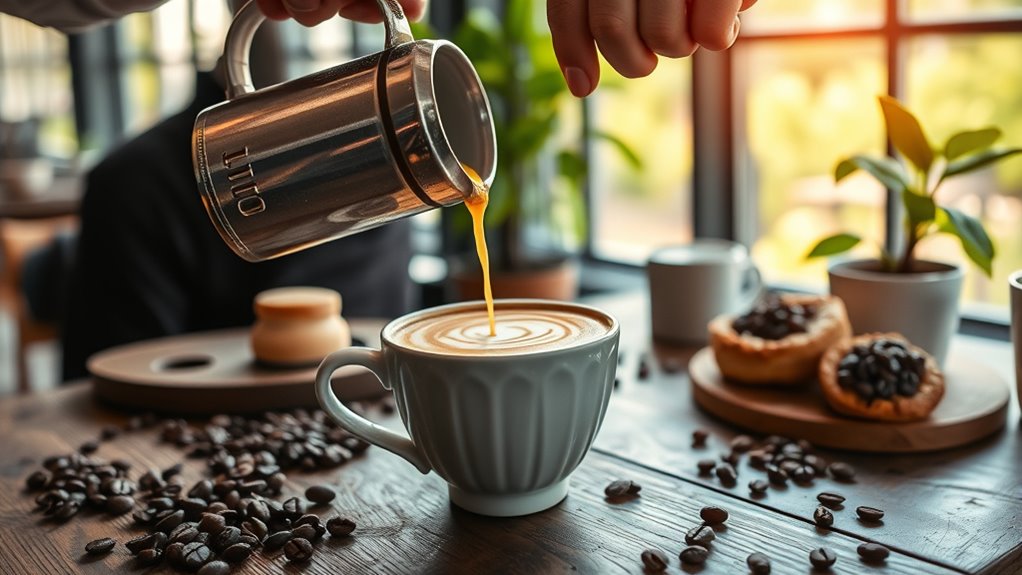
With the coffee landscape evolving, specialty coffee has emerged as a beacon for those seeking quality and authenticity. You’re not just drinking coffee; you’re embracing a movement that prioritizes sustainability and ethical sourcing.
Millennials, in particular, are driving this trend, willing to pay a premium for high-quality beans that offer unique flavors and traceable origins. As the global coffee market grows, specialty coffee takes center stage, reflecting consumer values that favor transparency in production. Coffee consumption varies significantly across different cultures, showcasing the diverse appreciation for this beloved beverage. Additionally, various brewing methods influence the overall taste experience, making each cup unique.
Innovative brewing methods, like cold brew and Center Cut Coffee, cater to your desire for smoother flavors and cleaner profiles. This quest for quality highlights a shift where taste and ethics go hand in hand, redefining what coffee means to you. Many consumers are increasingly drawn to brands that emphasize ethical sourcing practices, aligning their purchases with their values.
The Influence of Ethical Sourcing on Consumer Behavior
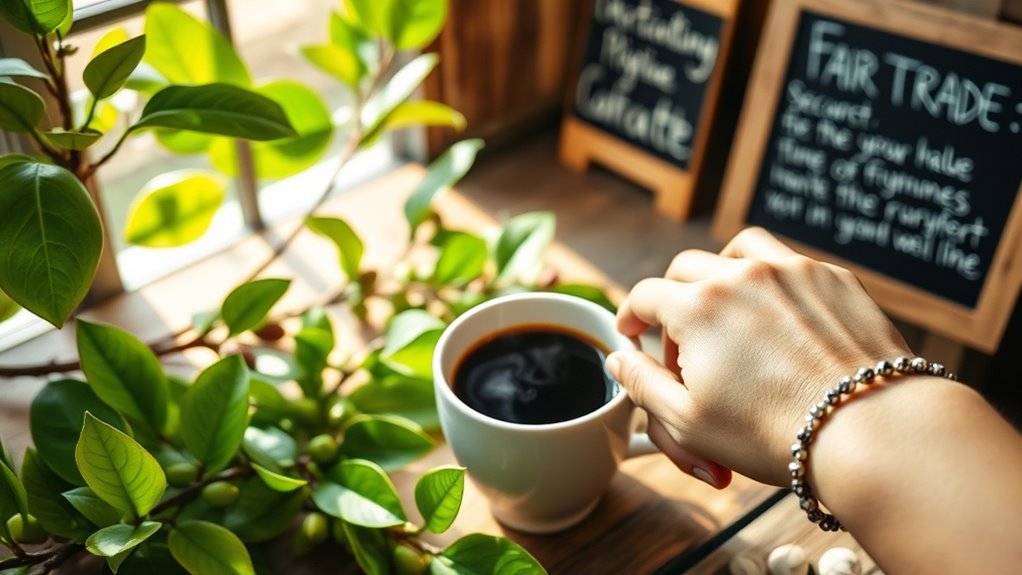
Ethical sourcing has become a key factor in shaping consumer behavior, particularly among younger generations who prioritize social responsibility.
As a coffee drinker, you’re likely aware that Millennials and Gen Z are willing to pay a premium for sustainable practices. About 75% of you prefer brands that provide transparency regarding sourcing and production methods, emphasizing the demand for traceable origins.
This shift in values has propelled the rise of specialty coffee, where unique taste experiences are paired with ethically sourced beans. Additionally, over half of consumers support social enterprise coffee shops, reflecting a strong interest in businesses that positively impact communities.
In this landscape, sustainable practices aren’t just trends; they’re necessities that resonate deeply with your values.
Shifts in Coffee Consumption Patterns Among Younger Generations
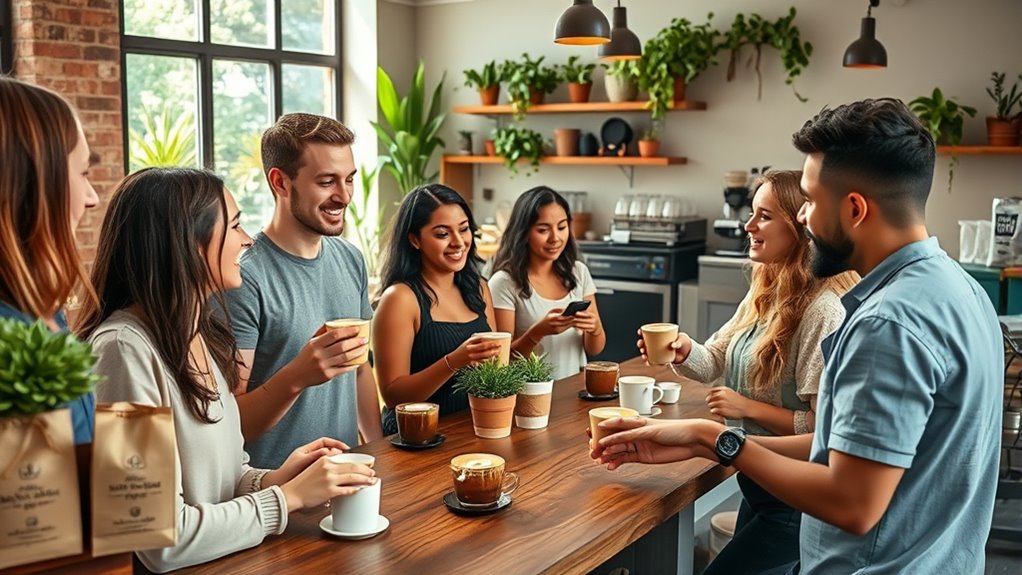
Consumer values are reshaping not just what you drink but how you consume coffee. Younger consumers, especially Gen Z, are starting their coffee journeys at around age 15, gravitating towards trendy beverages with diverse flavors and non-dairy milks.
This generation, alongside Millennials, is driving the demand for sustainable and ethically sourced coffee, aligning their choices with their values. The rise of instant coffee and mixes highlights their preference for convenience, as they seek budget-friendly options for at-home coffee consumption.
Additionally, health concerns are pushing about 2 in 5 UK consumers to reduce caffeine intake, increasing interest in low- and no-caffeine coffee variants.
Social media further influences these shifts, emphasizing speed, aesthetics, and customization in coffee experiences.
Convenience and Innovation in At-Home Coffee Experiences
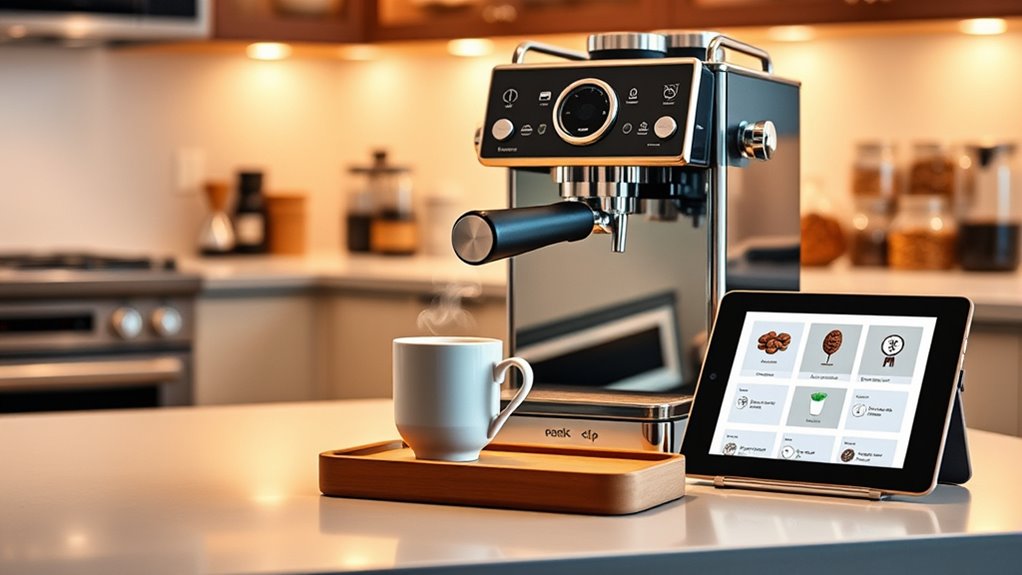
As you explore the world of at-home coffee, you’ll notice a shift toward convenience and innovation.
Instant coffee’s popularity is soaring, and smart coffee appliances are making brewing easier than ever.
With new techniques and products, you can enjoy café-quality coffee right in your kitchen.
At-Home Brewing Techniques
With the rise of at-home coffee brewing, many people are discovering the joy and convenience of crafting their favorite beverages right in their kitchens.
Millennials and Gen Z are fueling this trend, embracing at-home brewing techniques that prioritize ease of preparation. You might find that products like specialty coffee pods and cold brew concentrates allow you to enjoy barista-quality experiences without the hassle.
Coffee innovation has made it easier than ever to replicate café flavors at home, catering to consumer preferences for sustainability and ethical sourcing. Additionally, freshly squeezed juices can complement your coffee experience, offering a refreshing beverage option that enhances your morning routine.
As you experiment with different brewing methods, you’ll appreciate how these advancements not only save you money but also fit seamlessly into your busy lifestyle, transforming your daily coffee routine into a delightful ritual.
Instant Coffee Popularity
While many coffee lovers once dismissed instant coffee as a lesser option, its popularity has surged, particularly among younger generations seeking convenience without sacrificing flavor. Millennials and Gen Z are driving this trend, favoring innovative instant coffee blends and ready-to-drink (RTD) formats that align with their busy lifestyles. Additionally, this shift in preferences mirrors a wider trend toward plant-based diets, as consumers increasingly prioritize health and sustainability in their choices.
| Consumer Trend | Impact on Instant Coffee |
|---|---|
| Rising Inflation | Increased demand for affordable options |
| At-Home Consumption | Growth in quick brewing solutions |
| Preference for Flavor | Focus on rich flavor profiles |
| Innovative Formats | Surge in RTD and instant blends |
As you look for quick yet satisfying coffee options, instant coffee meets your needs while reflecting broader consumer values in today’s market.
Smart Coffee Appliances
Smart coffee appliances are revolutionizing the at-home brewing experience, making it easier than ever for you to enjoy café-quality coffee.
With the rise of consumer values focusing on convenience and sustainability, these innovative machines cater to your desire for personalized brewing. Many of them can be controlled through apps, allowing you to customize grind size and temperature for that perfect cup.
As younger generations seek tech-enabled experiences, brands are stepping up their game, offering solutions that minimize waste and promote environmentally responsible practices.
This shift toward at-home coffee isn’t just about speed; it’s about quality, too. Embrace the future of coffee with smart appliances that elevate your daily brew while aligning with your values.
The Impact of Social Media on Coffee Trends

Social media’s influence on coffee trends is hard to ignore, especially with the rise of influencer culture shaping what you consider your next favorite drink.
You can’t help but notice how aesthetic coffee presentations flood your feed, making you crave those picture-perfect lattes and colorful iced coffees.
As you scroll, those visually appealing beverages not only catch your eye but also spark your desire to try something new and share your own creations.
Influencer Culture’s Influence
As coffee culture evolves, the impact of influencer culture on social media becomes increasingly evident. You can see how coffee consumers are swayed by visually appealing posts, driving demand for unique beverages. With platforms like Instagram and TikTok, emerging trends in specialty coffee foster consumer awareness and enhance the coffee shop experience. Here’s a quick look at how influencers shape your coffee choices:
| Influencer Impact | Consumer Response | Brand Strategy |
|---|---|---|
| Visually appealing content | Increased interest in specialty coffee | Promote RTD options |
| Convenience and shareability | Preference for customizable drinks | Emphasize sustainability |
| Authentic recommendations | Stronger brand loyalty | Leverage partnerships |
Ultimately, social media shapes your coffee journey, making it more enjoyable and aligned with your values.
Aesthetic Coffee Presentation
While scrolling through your feed, you can’t help but notice the stunning coffee creations that pop up, showcasing the powerful influence of aesthetic presentation on consumer choices.
With Gen Z and Millennials leading the charge, customization and visual appeal have become essential for coffee brands. You’re drawn to vibrant colors and unique designs that not only satisfy your taste buds but also make for perfect Instagram posts.
Coffee shop apps enhance this experience by allowing you to share your beautifully crafted drinks, boosting brand loyalty among customers who crave that Instagrammable moment.
As 30% of coffee drinkers prioritize aesthetics, brands that embrace this trend through eye-catching presentations are winning over a larger audience and securing consumer devotion.
Health Consciousness and Its Role in Coffee Preferences
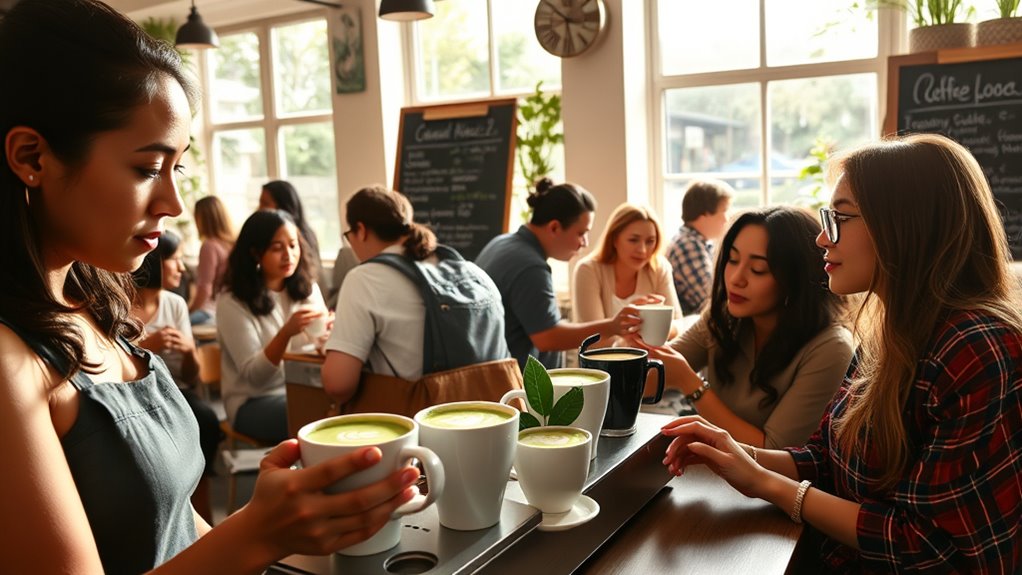
Health consciousness greatly influences your coffee preferences, as more consumers seek options that align with their wellness goals.
You might be among the 40% of UK consumers actively reducing caffeine intake, opting for low-caffeine coffee to support your health.
With a 30% increase in low- and no-caffeine coffee products from 2022 to 2023, brands are responding to your dietary awareness and desire for healthier choices.
You’re likely interested in coffee’s health benefits, from potential weight loss to performance enhancement, driving product innovations.
However, while you prioritize health, taste and indulgence still matter; striking the right balance between flavor and health benefits remains essential in your coffee selection.
The Evolution of Coffee Rituals in Modern Culture
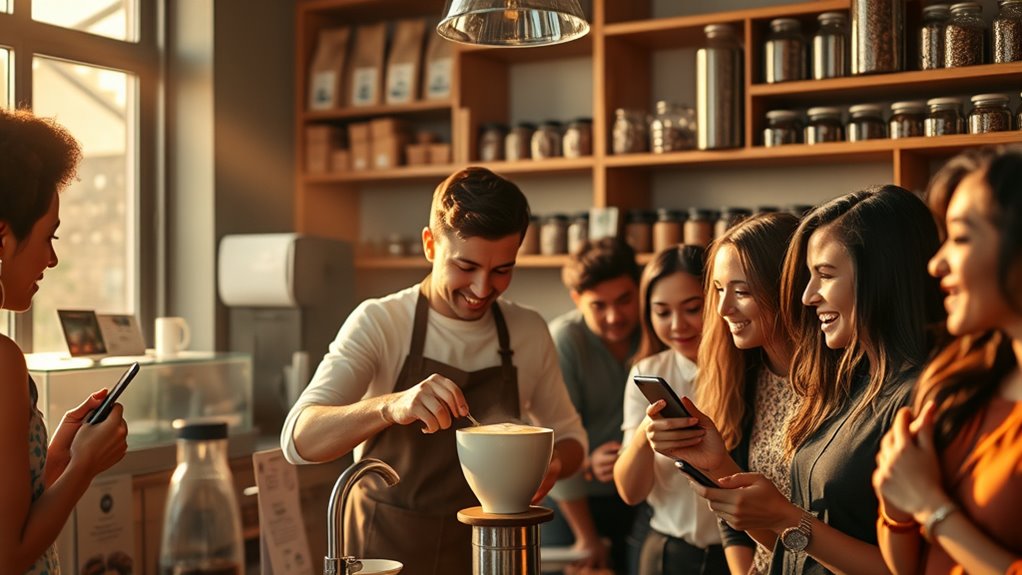
The way you enjoy coffee has transformed considerably, influenced by social media and changing lifestyles.
Today’s consumers seek a unique coffee experience, sharing aesthetic brews online and embracing customization. Younger generations, especially Millennials and Gen Z, prioritize convenience, opting for app-powered ordering and ready-to-drink options that fit their fast-paced lives. Additionally, coffee’s health benefits are increasingly highlighted, as consumers become more aware of the positive effects of coffee on cognitive function and mood enhancement. In a similar vein, many are also discovering frozen yogurt’s health benefits, such as probiotics that promote gut health and lower calorie options. As a result, sustainable living practices are also becoming integral to how coffee is enjoyed, with consumers seeking eco-friendly choices in their daily routines. Incorporating essential oils into coffee can offer additional health benefits and unique flavors.
The pandemic accelerated at-home coffee rituals as you tried replicating café vibes, leading to a boom in instant coffee and specialty equipment purchases.
The pandemic sparked a surge in at-home coffee rituals, inspiring many to recreate café experiences with instant coffee and specialty gear.
Health-conscious choices now dictate preferences, with many reducing caffeine intake or turning to low-caffeine alternatives. Additionally, hydration support has become a focus, as you explore beverages that complement your wellness goals.
Additionally, sustainability has become a key trend, as you favor brands committed to ethical sourcing, reflecting your values of environmental responsibility and fair trade practices in every cup.
Regional Variations in Coffee Consumption and Trends
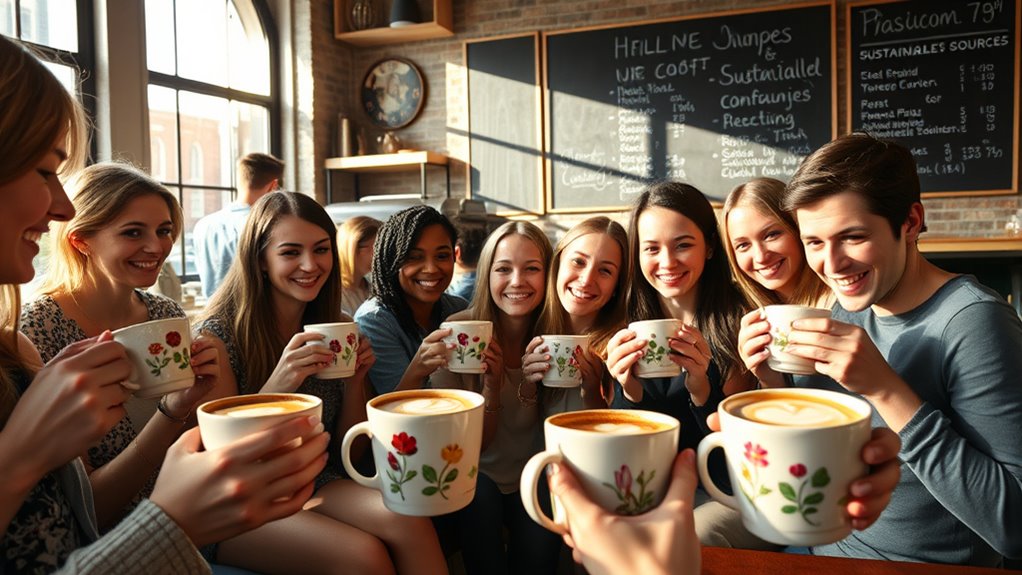
As coffee culture continues to evolve, regional variations in consumption and trends highlight the diverse preferences and practices around the world.
You’ll find that coffee consumption varies considerably, influenced by local consumer values and traditions. Here are some key trends:
- North America thrives on specialty coffee, seeking premium options that enhance daily rituals.
- The Asia-Pacific region embraces coffee rapidly, desiring connections to Western lifestyles and indulgence.
- In Europe, consumers are passionate about unique taste experiences and sustainably sourced beans.
- Latin America balances tradition and innovation, showcasing rich brewing heritage while adapting to modern tastes.
These variations illustrate how deeply personal and culturally significant coffee remains, reflecting not just preferences but also evolving consumer values across the globe.
The Future of Coffee: Balancing Tradition With Modern Values
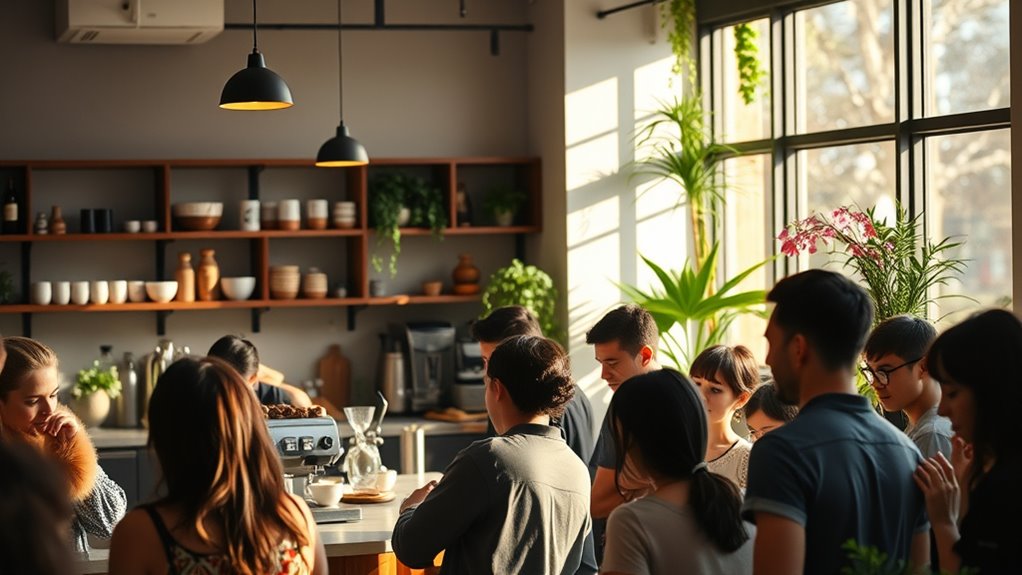
Coffee’s rich heritage is facing a dynamic shift as consumers increasingly seek ways to blend tradition with modern values. The coffee market, projected to reach $473.10 billion by 2025, shows this evolving landscape. Younger generations prioritize sustainable coffee and health-conscious choices, driving brands to adopt ethical practices alongside traditional brewing methods. Additionally, many consumers are drawn to the caffeine content of their beverages, seeking options that align with their lifestyle choices.
| Traditional Aspects | Modern Innovations | Consumer Preferences |
|---|---|---|
| Craftsmanship in brewing | Specialty and cold brew | Convenience at home |
| Ethically sourced beans | Unique taste experiences | Low or no-caffeine options |
| Rituals and community | Tech-driven solutions | Transparency in sourcing |
As you navigate this trend, you’ll see a beautiful blend of the old and the new, ensuring coffee culture thrives in a changing world. The emphasis on sustainable coffee reflects a growing desire for ethical consumption among consumers.
Frequently Asked Questions
How Do Coffee Trends Affect Local Economies and Farmers?
Coffee trends can greatly impact local economies and farmers. When you choose to support specialty coffee, you’re often helping small-scale farmers earn fair wages.
As demand for unique blends rises, local cafes thrive, creating jobs and fostering community. You might notice that sustainable practices become more popular, further benefiting the environment.
What Role Do Coffee Certifications Play in Consumer Choices?
Coffee certifications play an essential role in your choices as a consumer. When you see labels like Fair Trade or Organic, they signal quality and ethical sourcing.
These certifications assure you that the coffee meets specific environmental and social standards, influencing your purchasing decisions. You often feel more confident buying certified coffee, knowing it supports sustainable practices and fair treatment of farmers.
Ultimately, these labels help you align your values with your consumer habits.
How Can I Identify Truly Sustainable Coffee Brands?
Finding truly sustainable coffee brands is like searching for hidden gems in a vast ocean.
Start by looking for certifications like Fair Trade or Rainforest Alliance, which signal ethical practices. Immerse yourself in the brand’s story; check their sourcing methods and transparency.
Reviews from fellow coffee lovers can also guide you. Don’t shy away from asking questions directly to the brand.
Your choices matter, and they can brew a better world.
Are There Significant Differences in Coffee Preferences Across Cultures?
Yes, there are significant differences in coffee preferences across cultures.
For example, in Italy, you’ll often find espresso being enjoyed quickly, while in the United States, people may prefer larger cups of brewed coffee.
In Sweden, coffee breaks known as “fika” emphasize socializing over small pastries and coffee.
Each culture brings its own rituals and flavors, influencing how you experience and appreciate coffee.
Exploring these variations can deepen your understanding of global coffee enjoyment.
How Do Seasonal Trends Influence Coffee Flavors and Offerings?
You’ll notice that as seasons change, so do the coffee flavors and offerings at your favorite café.
In the fall, spiced pumpkin lattes pop up, evoking warm, cozy feelings.
Winter brings rich, chocolatey blends that complement chilly nights.
Spring surprises you with floral notes, while summer offers invigorating iced brews.
These seasonal trends not only cater to your cravings but also create a sense of connection and nostalgia, making your coffee experience uniquely enjoyable.
Conclusion
As you sip your ethically sourced, artisanal brew from a sleek, eco-friendly cup, it’s ironic how far we’ve come from the days of instant coffee and disposable cups. In your quest for quality, convenience, and sustainability, you might just be brewing more than a morning fix—you’re crafting a lifestyle statement. Who knew that your daily caffeine kick could reflect such profound values? In the end, every cup you drink shapes not just your day, but the future of coffee itself.
